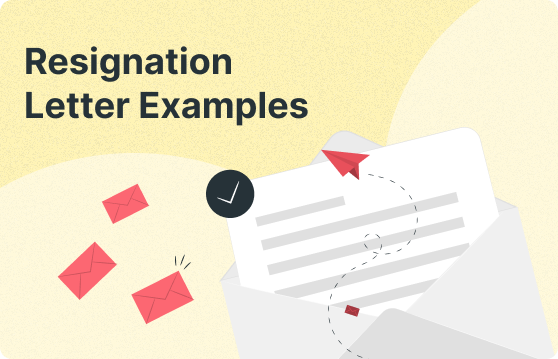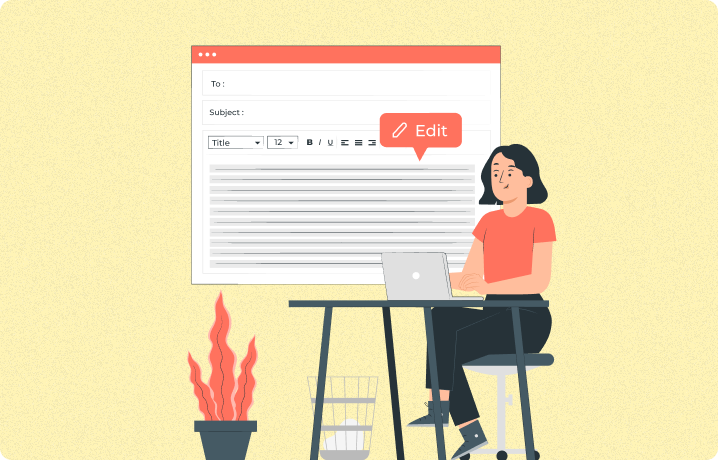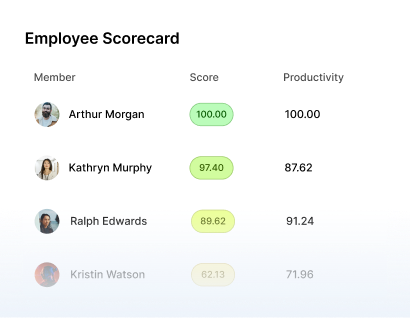How to Write a Resignation Email: 12 Resignation Letter Email Examples

A resignation email is a formal written communication that an employee sends to their employer to announce their decision to leave a job position.
It serves as an official notification of resignation, providing key details such as the employee’s last working day and any transitional support they are willing to offer.
This email is often sent to a direct supervisor, the human resources department, or both, depending on the company’s policy.
Why is Writing a Resignation Email Properly Important?
A resignation email is not just a formality; it’s a critical step in leaving a job with professionalism and grace.
Writing it thoughtfully can help you exit your role respectfully, preserve valuable connections, and set the stage for your next career move.
Key Elements of a Resignation Email

A resignation email is a professional and formal way to notify your employer of your decision to leave your position.
To ensure it is clear, respectful, and effective, it should include several essential components. Here’s a breakdown of the key elements:
1. Subject Line
The subject line should be clear and concise to indicate the purpose of the email immediately. Examples include:
- “Resignation – [Your Full Name]”
- “Notice of Resignation”
This helps your manager or HR department quickly identify the email’s purpose, ensuring timely attention.
2. Greeting / Opening Salutation
Start your email with a professional salutation, addressing your manager or HR representative directly. For instance:
- “Dear [Manager’s Name],”
- “Dear [HR Representative’s Name],”
Using their name shows respect and sets the right tone for the email.
3. Statement of Resignation
Clearly and politely state your intention to resign from your position. Mention the role you are leaving and include the date of your last working day. For example:
- “I am writing to formally resign from my position as [Your Job Title], effective [Last Working Day, typically two weeks from the email date].”
This leaves no room for ambiguity and ensures clarity.
4. Expression of Gratitude
Take a moment to thank your employer for the opportunities, support, and experiences you gained during your time with the company. This helps maintain a positive tone and leaves a lasting impression. For example:
- “I am grateful for the opportunities and support I have received during my time at [Company Name].”
5. Reason for Resignation (Optional)
You may choose to briefly mention why you’re resigning, though this is optional. Common reasons include career growth, relocation, or personal circumstances. Keep it concise and professional:
- “This decision was made to pursue an opportunity that aligns with my long-term career goals.”
Avoid sharing negative feedback or grievances in this email.
6. Offer to Assist with Transition
Show your willingness to help ease the transition by offering to train a replacement, hand over responsibilities, or assist during your notice period. For instance:
- “I am happy to assist with the transition process, including training my replacement or completing any necessary handovers.”
This demonstrates accountability and leaves a positive impression.
7. Closing Statement
End your email on a positive note, expressing your willingness to stay connected or extend well wishes to the company. For example:
- “I wish [Company Name] continued success and hope to stay in touch in the future.”
8. Your Contact Information
Include your updated contact details, especially if you’re open to staying connected professionally or need to coordinate further with HR.
9. Professional Sign-Off
Use a courteous and professional closing, such as:
- “Best regards,”
- “Sincerely,”
Follow this with your full name.
Including these key elements ensures your resignation email is professional, respectful, and well-received.
This approach not only facilitates a smooth transition but also strengthens your reputation as a responsible and considerate professional.
Maximize productivity of your business
Track employee productivity and simplify work with them
12 Resignation Letter Email Examples

1. General Resignation Email
Subject: Resignation – [Your Name]
Dear [Manager’s Name],
I am writing to formally resign from my position as [Your Position] at [Company Name], effective [Last Working Day].
I am grateful for the opportunities and support provided during my time here. Working with such a talented team has been a rewarding experience.
I am committed to ensuring a smooth transition and am happy to assist with training or handing over responsibilities during my remaining time.
Thank you once again for the opportunity to contribute to [Company Name]. Please feel free to contact me at [Your Email Address] or [Phone Number] if needed.
Best regards,
[Your Name]
2. Short and Simple Resignation Email
Subject: Resignation – [Your Name]
Dear [Manager’s Name],
Please accept this email as my formal resignation from [Company Name], effective [Last Working Day]. I am grateful for the experiences and opportunities I have had during my time here.
Best regards,
[Your Name]
3. Resignation Email for Personal Reasons
Subject: Resignation – [Your Name]
Dear [Manager’s Name],
I regret to inform you that I must resign from my position at [Company Name] due to personal reasons. My last working day will be [Last Working Day].
Thank you for your understanding and for the support I have received throughout my time here. I hope to stay in touch and wish the team continued success.
Kind regards,
[Your Name]
4. Resignation Email for Health Reasons
Subject: Resignation – [Your Name]
Dear [Manager’s Name],
It is with a heavy heart that I submit my resignation due to health reasons, effective [Last Working Day]. This decision was not easy, but it is necessary for my well-being.
I am grateful for the opportunities I have had at [Company Name] and will always value my time here. I am happy to assist with a smooth transition.
Thank you for your support and understanding.
Sincerely,
[Your Name]
5. Resignation Email for Career Advancement
Subject: Resignation – [Your Name]
Dear [Manager’s Name],
After careful consideration, I have decided to resign from my role at [Company Name], effective [Last Working Day], to pursue an opportunity that aligns with my long-term career goals.
I am immensely grateful for the knowledge, experiences, and relationships I have gained during my time here. I am committed to ensuring a smooth handover and will assist in any way I can during the transition period.
Thank you for your guidance and support.
Warm regards,
[Your Name]
6. Resignation Email for Relocation
Subject: Resignation – [Your Name]
Dear [Manager’s Name],
I am writing to formally resign from my position at [Company Name], as I will be relocating to [New Location]. My last working day will be [Last Working Day].
It has been a pleasure working with you and the team, and I am thankful for the opportunities I have had here. I am happy to assist with the transition process.
Best regards,
[Your Name]

7. Resignation Email with Immediate Effect
Subject: Immediate Resignation – [Your Name]
Dear [Manager’s Name],
Due to unforeseen circumstances, I must resign from my position at [Company Name] effective immediately.
I apologize for any inconvenience this may cause and am grateful for the support I have received during my tenure. Please let me know how I can assist in wrapping up my responsibilities.
Sincerely,
[Your Name]
8. Resignation Email with Notice Period
Subject: Resignation – [Your Name]
Dear [Manager’s Name],
I am providing this formal notice of my resignation from [Company Name], effective [Last Working Day]. This provides a notice period of [Notice Period Length], as per company policy.
I am grateful for the opportunity to contribute to [Company Name] and will do my best to ensure a seamless transition during this time.
Best regards,
[Your Name]
9. Resignation Email After a Short Tenure
Subject: Resignation – [Your Name]
Dear [Manager’s Name],
I regret to inform you that I must resign from my role at [Company Name]. My last working day will be [Last Working Day].
Though my time here has been brief, I am grateful for the experiences and lessons I have gained. I will do my best to wrap up my responsibilities during my notice period.
Thank you for your understanding.
Kind regards,
[Your Name]
10. Resignation Email to HR
Subject: Formal Resignation Notice – [Your Name]
Dear [HR Representative’s Name],
This email serves as my formal resignation from [Company Name], effective [Last Working Day]. Please let me know the steps required to finalize the process, including handing over company property and exit documentation.
Thank you for your assistance during this transition.
Best regards,
[Your Name]
11. Resignation Email to Pursue Further Education
Subject: Resignation – [Your Name]
Dear [Manager’s Name],
I am resigning from my role at [Company Name], effective [Last Working Day], to pursue further education and professional development.
Thank you for your guidance and support, which have been invaluable during my time here. I am committed to ensuring a smooth transition.
Kind regards,
[Your Name]
12. Resignation Email with Gratitude
Subject: Resignation – [Your Name]
Dear [Manager’s Name],
I am writing to inform you of my resignation from [Company Name], effective [Last Working Day].
I am deeply grateful for the opportunities, support, and guidance I have received during my time here. Working with you and the team has been an incredible experience, and I will cherish the memories I’ve made.
Thank you for everything. I hope to stay in touch and wish you and the company continued success.
Warm regards,
[Your Name]
Conclusion
A well-written resignation email ensures you leave your role on a positive note, maintaining professional relationships and setting the stage for future opportunities.
Use the examples provided to tailor your message based on your specific circumstances, and remember to keep it professional, concise, and courteous.
– The Monitask Team
Frequently Asked Questions
Why is it important to write a proper resignation email?
A properly written resignation email helps maintain professionalism, ensures clear communication, preserves relationships, and provides a documented record of your resignation. It also helps you leave the organization on good terms, which is crucial for future references and networking.
Should I include the reason for my resignation in the email?
Including the reason for your resignation is optional. If you choose to share it, keep the explanation brief and professional. Focus on positive aspects rather than detailing any grievances.
Do I need to thank my employer in the resignation email?
Yes, expressing gratitude is a key part of a resignation email. Thanking your employer for the opportunities and support during your tenure helps maintain a positive tone and leaves a lasting impression.
What tone should I use in my resignation email?
The tone of your resignation email should be polite, professional, and positive. Avoid negative comments or criticisms, even if your experience was less than ideal.
Can I use a resignation email template?
Yes, using a template can help you structure your email effectively. However, personalize the template to suit your specific circumstances and reflect your genuine gratitude and professionalism.



